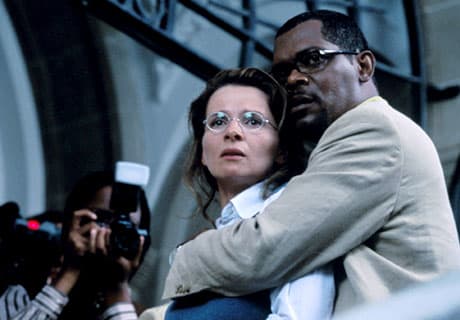All phoney liberals in our readership are advised to make a beeline for John Boorman's In My Country; they'll be happy to find a beautiful foreign location (South Africa) with a pressing social issue (the Truth and Reconciliation hearings) to patronise. They'll be provided with journalist-surrogates (cultured Afrikaner Juliette Binoche, black American Samuel L. Jackson) who stand around and gab. And they'll thrill to the apartheid victims who are trotted in to tell their horrifying stories only to be wheeled out once they've served their function.
What they won't get is any clear purpose to its wallow in the dark passages of South African history we get that torture and oppression are bad, but the massive blocks of dialogue don't get around to fashioning an answer to its question of what to do when it happens in your country? The point is to avoid an answer while providing a clear-cut villain (police torturer Brendan Gleeson) to deflect the messy questions, and a lot of talk around the issue so that you can appear to be dealing with it.
There's some gratuitous melodrama involving Binoche and Jackson's attraction, and lines about "getting the truth," as if it were available in two-litre jugs at the 7-Eleven, but precious little serious engagement with the issues. Only during the hearings (and an excursion to a police torture farm) does this disgraceful film have any bite, and then only to remind you of what the filmmakers are frittering away.
Pandering to the basest, most self-righteous impulses of the white audience, it obscures far more than it reveals and trivialises the things of most importance. Phoney liberals will love it. (Mongrel Media)
What they won't get is any clear purpose to its wallow in the dark passages of South African history we get that torture and oppression are bad, but the massive blocks of dialogue don't get around to fashioning an answer to its question of what to do when it happens in your country? The point is to avoid an answer while providing a clear-cut villain (police torturer Brendan Gleeson) to deflect the messy questions, and a lot of talk around the issue so that you can appear to be dealing with it.
There's some gratuitous melodrama involving Binoche and Jackson's attraction, and lines about "getting the truth," as if it were available in two-litre jugs at the 7-Eleven, but precious little serious engagement with the issues. Only during the hearings (and an excursion to a police torture farm) does this disgraceful film have any bite, and then only to remind you of what the filmmakers are frittering away.
Pandering to the basest, most self-righteous impulses of the white audience, it obscures far more than it reveals and trivialises the things of most importance. Phoney liberals will love it. (Mongrel Media)
